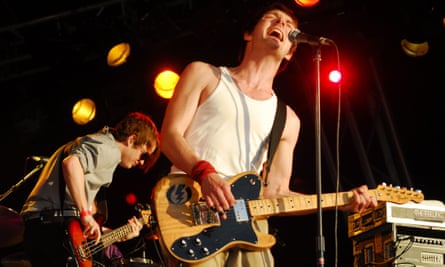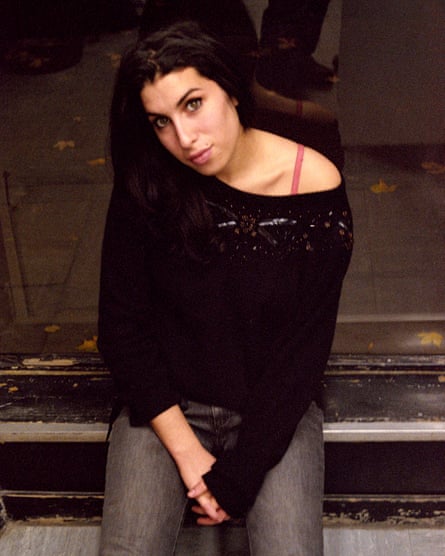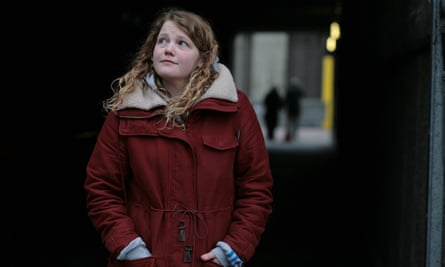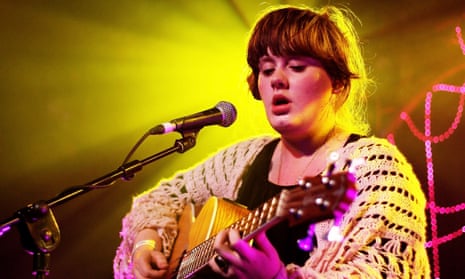When it opened in Croydon, south London, in 1991, few knew that the Brit School – part of the Thatcher government’s controversial City Technology Colleges initiative – would change the landscape of British music.
An independent, free-to-attend arts school funded by the government with support from the Brit Trust, it was propelled into the spotlight in the mid-00s thanks to its first crop of musical talent. While alumni such as Amy Winehouse, Adele and the Feeling became hugely successful, and in total its students have collectively sold more than 250m albums and won 15 Brit awards, the school has also been the subject of much criticism.
It is seen by some as a conveyor belt for cookie-cutter pop artists, and its students were ridiculed by Arctic Monkeys’ Alex Turner at the 2008 Brit awards (“We all went to the Brit School, we remember you all,” he said sarcastically), while three years later Ed Sheeran dissed the school on his anti #haterz anthem, You Need Me, I Don’t Need You.
In recent years a set of more musically daring acts such as King Krule, Kae Tempest and Black Midi have helped shift perceptions of the school. But with arts funding cuts on the horizon, what is the legacy of – and future for – the Brit School?

In the beginning
Dan Gillespie Sells (frontman, the Feeling) I went in the early days at the end of the 90s. People were sceptical because it had come about as part of Thatcher’s academy school programme. Being a kid from a queer family, it’s not often that I would like to thank Thatcher for anything.
Stuart Worden (principal, 1994-present) Back then, it was pretty much: if you applied you got a place. You’d meet kids who wanted to write hit singles, or wanted to be in movies, and they didn’t quite know how to get there, and we didn’t quite know how to get them there. We were making it up.
Maggie Crowe (director of events and charities, British Phonographic Industry) When the proposal was first put forward to the music industry, the core values were always to make it open to all based on their enthusiasm rather than academic prowess.
Gillespie Sells My mates thought it was like Fame. At that stage I’d been playing in rock bands, so the idea of going to a school like that was the most uncool thing you could imagine. Thank God I got over all that and became a pop queen.
Worden Before I arrived, people were saying: “Don’t go there, it’s a Kids from Fame school in Croydon.” Two things: why shouldn’t kids from Croydon be successful? And what was wrong with Fame anyway? It really inspired me.
Gillespie Sells I used to be that self-conscious teenager who didn’t want to be seen going to this jazz-hands-y stage school, but as soon as I got there I realised that wasn’t what it was. It had people doing gospel and R&B, and it had metalheads who had come from the Surrey suburbs.
Worden When we first started there was no doubt we needed to improve how we did in the national curriculum. We weren’t getting great maths, English and science scores, but for the last 23 years we’ve been way above the national average.
Gillespie Sells I don’t even remember if I sat the exams in the end because the environment was what it was all about. That’s where I met the Feeling. We formed a band after about two days and we’ve been together now for 25 years. In terms of how strict it was, it’s all carrot and so there’s very little stick needed. It wasn’t like anyone had to be whipped into shape because you were just there. You were present. You were creating.
Worden [Not charging fees] is the beginning, the middle and the end of why the school is successful. You can’t pay your way into this industry through the Brit School. In terms of demographic, 45% of our students are from a global majority. Over 20% are on free school meals or from areas of social deprivation.
Jordan Stephens (Rizzle Kicks) I was on government support for low-income families at Brit. I went to the induction day, and I was interested in music but the principal at the time [Nick Williams] said: “Look, the standard for music is super high, if you can’t play two instruments then give it a miss.” So I did broadcasting and digital communication.
Worden It’s never been just a music school. The whole ecosystem of the arts has always been here.
The mid-00s explosion

Rachel Chinouriri (singer-songwriter) I knew of the Brit School because of Adele, Jessie J, Rizzle Kicks, so many other people who had gone there. I thought going there would teach me the right ways to get into the industry.
Worden Amy [Winehouse] came out just at the same time as Katie Melua. Also around that time you had Leona Lewis, Kate Nash, and Adele was just on her way. Amy was dynamic here. And hardworking, talented and focused. Also, there was a clarity about what her music was about. And what her style was going to be about, because there’s no uniform.
Gillespie Sells We had a girl in our class that dressed as a Barbie doll. Her name was Lindy Lou. She teaches opera now.
Mark Beaumont (music journalist) Early on, we saw huge mainstream acts like Adele and Amy Winehouse emerge from the school, alongside commercially minded indie bands such as Athlete. It made the school seem focused on commercialism.
Chinouriri These are legendary people who will go down in history for the rest of the planet’s existence. When Adele dies our children’s children’s children’s children are still going to be talking about her legacy. Same with Amy Winehouse.
Stephens I could not give a fuck about the British empire, but the actual creative legacy of this country is so incredible. There’s a high probability that someone coming through that school is going to become an absolute tour de force.
The backlash
Stephens All the bad reputation the Brit School has ever had comes exclusively from the musical theatre kids. I think they’d probably admit that, too.
Gracey (singer-songwriter) I think that is so mean. I don’t know what it is about Brit, but everybody seems to think musical theatre kids are the worst. They’re a lovely bunch of kids.
Stephens The only time anyone would get in trouble would be for telling them to shut the fuck up. Sometimes they would literally just burst into song during fire drills.
Seren Makondolevay (current student) They’re definitely … enthusiastic. The music kids are quite shy in comparison. A lot of us stand at the back of the stage, or like writing in our bedrooms.
Crowe I have never really sensed much negativity towards the school – just a whole lot of love.
Gillespie Sells After we left we didn’t mention the Brit School for a while. People thought we’d gone to this school to be turned into pop stars. The music press, particularly places like the NME, had this obsession with credibility. Anyone who knows anything about music knows what a bullshit word that is to put in the mix.
after newsletter promotion
Beaumont [The mid-00s] were a period when a lot of attention was paid to the authenticity of new acts. In the wake of the huge success of the Arctic Monkeys there was a rush of alternative acts into the charts – it’s where the awful “landfill indie” slur originated – and a lot of people were looking to invalidate it. It was easier to label Brit School bands like the Kooks as inauthentic rather than acts like Jessie J or Adele, who were allowed to play by the mainstream rules.
Gillespie Sells There was this idea that if you’d gone to the Brit School you’d gone to this strange laboratory where people were being piped out. By the time we left that was already an outmoded idea, but those middle-aged guys who wrote for the NME were still living out their punk dream and hadn’t moved on.

Beaumont Brit School alumni often got a free pass from critics compared to working-class bands from north of London, who were relentlessly slapped with the “landfill indie” tag and told to get back in their box.
Gillespie Sells As soon as [Amy and Adele] became big and they were critically acclaimed enough to not be seen as stage school fodder then we all opened up and went: “Yeah we went to Brit School”. Eventually the third wave of landfill indie died off and people started to enjoy pop music again. It didn’t matter where you came from.
Worden I thought Alex Turner’s Brits gag was funny if slightly misguided, because it came from a lack of knowledge. I wish the Arctic Monkeys had come from here. They’re dynamite. But we don’t take ourselves that seriously.
Beaumont Arctic Monkeys had kicked off something of an alternative revolution, and the formulaic pop of many Brit School acts represented the sort of music they were rebelling against.
Stephens On Ed Sheeran’s You Need Me, I Don’t Need You he says, “I will blast and I didn’t go to Brit School”. I remember us going: “What’s wrong with Brit School, bruv?” He was saying people assumed he’d been. He was snapping back at Brit School.
Beaumont The school’s association with the Brit awards didn’t help: it looked from the outside like a training ground for success at a major mainstream awards ceremony, which is deeply inauthentic.
Crowe The Brits have raised many millions for the school and its students over the past 30 years – and [the awards night] is the moment where we try and combine that message that it’s a charity show alongside awarding the biggest music stars. The presence of the students has a great practical benefit by turbo-boosting the atmosphere.
Chinouriri I went [to the awards] in year 12 of school, the year that Adele looked into the crowd and was like: “I was once down there like one of you guys” [in 2016]. She was about five metres away from us. It gave us hope about being up there one day.
Changing the reputation

Worden Two things have happened to change people’s perceptions of the school. The first is the longevity of those artists that all seemed to appear at the same time. Also, the school made the decision to spread beyond music in terms of how we talk to the world. The polymathic nature of the Brit School student is important and the curriculum allows that now.
Chinouriri As soon as I left [in 2017] people would ask me what school I went to and when I said “Brit School” every single reaction was, “Oh wow” or “no way, I know this person from there”. Everyone in the industry knows the school. If you mention it more people are eager to work with you.
Beaumont That artists like Kae Tempest and Black Midi have emerged [from the school] recently makes it look far more interested in art and ideas.
Worden I was doing a piece of theatre about Aleppo. I wanted to explore what modern war would look like and how you could make a movement piece around it, so I turned to [then students] Black Midi and said: “I don’t suppose you fancy recording what war sounds like?” They made a 20-minute noise piece with screaming and helicopters. It is profound.
Chinouriri There was so much creativity. You’d walk into school and you’d see someone with their face painted like anime. In the corridor there’d be kids doing a flashmob. You’d go upstairs and there’d be someone building an enormous art piece out of carpets. The head teacher’s walking around with no shoes on, acting like everything’s normal.
Worden The beautiful thing about youth is that they’re gloriously reckless. They believe they can do pretty much anything. And why not? Also, people here now aren’t that bothered with fame. They do want to be successful, but fame is not their goal.
The future
Stephens Even if you were to approach the Brit School through a super conservative, capitalist mindset, it’s still a beneficial school. The amount of revenue that Adele alone has brought into this country is ridiculous.
Gracey It’s absolutely insane that there aren’t Brit Schools up and down the country – why is it just London?
Crowe: The school plays such a vital role for many thousands of young people of all backgrounds, often from deprived areas. That’s why the BPI is currently working hard to see if more schools like it can be set up in other parts of the country.
Beaumont A whole country full of Brit Schools will only help hone otherwise interesting and rough-edged acts into accessible, commercially aimed projects and encourage the industry not to look far beyond the schools for new talent. It would make British music more boring.
Stephens [Cuts in arts funding] is so nonsensical. Under the Tory government, and with budgets cut on youth work and creativity, all I’ve seen is this huge upsurge in anxious, frustrated, depressed youth that haven’t got a sense of community or an outlet for how they’re feeling. If anything, the Brits School is a shining example of how it should be.
